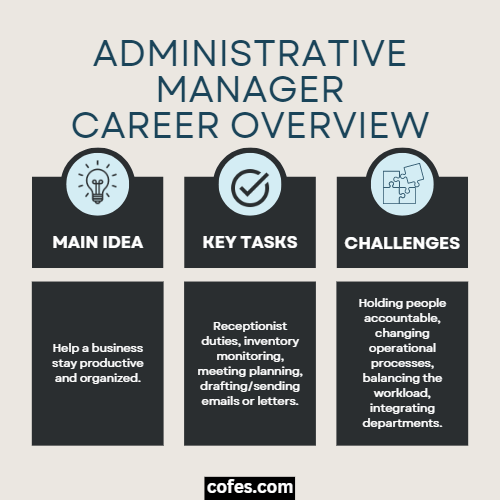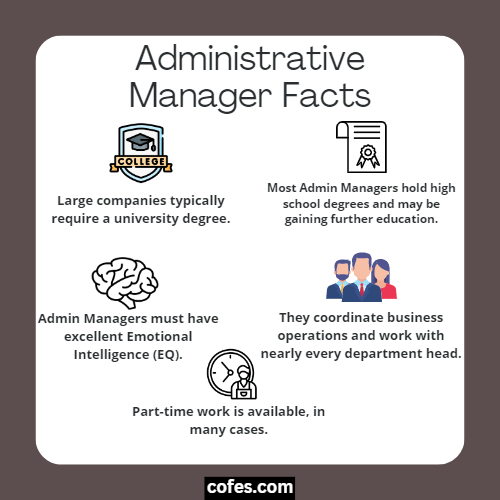Administrative Management: The Community Builders of an Organization
Over the years, the roles of Administrative Managers have become very flexible.
With the market for administrative software and virtual assistants increasing, some entry-level administrative positions are becoming outdated.
This position may be appealing to individuals who love making relationships with coworkers and managing an office setting or the behind-the-scenes ongoings of an office.
Administrative Manager Information
| Official Job Title | Administrative Manager |
| Average Salary | $60,640 |
| Stress Level | Average |
| Work/Life | High |
| Job Satisfaction | Average |
| Career Advancement | Below Average |
Administrative Manager Job Description
What Does An Administrative Manager Do?
Administrative Managers are responsible for creating and managing administrative and organizational systems that help a business stay productive and organized.
Other responsibilities include: supervising employees, answering calls, scheduling meetings, and preparing travel accommodations for executive staff.

What Does An Administrative Manager Do On A Daily Basis?
Daily, Administrative managers can find themselves greeting visitors, answering phone calls, writing emails, and delegating tasks to employees.
Frequently, Administrative Managers will be pulled into meetings to take minutes and find out supporting information for the meeting.
Administrative Managers also work as community builders and often are responsible for planning Christmas parties and organizing team-building events.
Responsibilities, Duties & Roles Of An Administrative Manager
An overview of the roles and responsibilities of an Administrative Manager include:
- Clerical tasks (i.e., scanning, printing, faxing)
- Delegate tasks to employees working in the office
- Receptionist duties such as answering phones, scheduling meetings, and providing general company information to clients
- Maintaining folders on file servers
- Monitors inventory for office supplies, kitchen condiments, and stationery
- Arranging meetings, appointments, and travel plans for the executive team
- Planning and organizing Christmas parties and team-building events
- Composing and editing letters, reports, memos, and emails
- Taking minutes during meetings
- Gathering information and putting together presentations for senior leadership
Administrative Manager Salary
Average Salary
According to PayScale, the average salary for an Administrative Manager in the U.S. is $60,640.
Starting Salary
According to PayScale, the starting salary for an Administrative Manager in the U.S. is $42,025.
It is common to start in an entry-level position, such as an administrative assistant or receptionist, before becoming an administrative manager.
Often, the additional years of experience result in a higher starting salary in this position.
Senior Salary
According to PayScale, after several years of experience, most senior-level Administrative Managers in the U.S. make $70,200.
How To Become An Administrative Manager
The Entry-level: Certification, Training & Degree
Most Administrative Management positions require a high school diploma.
Pursuing higher education and achieving a business degree may help improve the quality of your job prospects, but it is often not required.
It may be more beneficial to take online courses a few years into your career to gain the relevant skills to make you a top performer.
Online courses are by far the most economical option.
Most people working in Administrative Management started their career in entry-level positions such as administrative assistant or receptionist.
Other Skill Sets, Requirements, & Qualifications
Being an excellent Administrative Manager requires Emotional Intelligence (EQ), excellent communication skills, and a self-starter attitude.
Administrative Managers are seen as the glue that holds a company together internally.
Administrative Managers build strong relationships with employees, which leads to improved leadership.
They are excellent listeners and motivators and learn how to approach difficult conversations with grace.
Additional skill sets common among Administrative Managers are Microsoft Suite, Google Suite, Human Resource Management, office management, and operations management.
The days of barking orders and micromanaging are over.
Due to the increase in the gig economy, employers need a strong culture and relaxed atmosphere to retain top talent, and Administrative Managers play a significant role in this.
How Long Does It Take To Become An Administrative Manager?
It does not take long to become an Administrative Manager, as most jobs only require a high school diploma and a couple of years of relevant experience.
In roles like these, experience is more valuable, mainly if the candidate already works for the company in some capacity and has an excellent way of providing value.
Is It Hard To Become An Administrative Manager?
No. Becoming an Administrative Manager is not hard to achieve.
A high school diploma, relevant experience, and providing extraordinary value to an organization are often how Administrative Managers receive their roles.
Administrative Manager Career Paths
The Administrative Management Career Roadmap
In positions relating to Administrative Management, experience is often more valuable than higher education.
An employee who is familiar with how a company operates and knows how to get things done is critical.
Entry-level jobs in this career path include administrative assistant, receptionist, and office coordinator.
Securing one of these jobs is a great way to launch your career in administrative management.
It is prevalent for employees in these entry-level positions to work their way up and become Administrative Managers.
Projections For Growth In Administrative Management
Jobs in administrative services are projected to grow 7% over the next ten years, according to the U.S. Bureau of Labor and Statistics (BLS), meaning that it is an excellent career to pursue.
However, with the increase of administrative software and virtual assistants, entry-level positions in this field could quickly become obsolete.
In Summary: Is Administrative Management A Good Career?
Yes. Administrative Management can be an excellent career for people who enjoy building relationships and completing various tasks and projects.
With this being said, Administrative Management can be competitive due to the decrease in entry-level jobs.
While there still is a need for Administrative Managers, entry-level positions could quickly become obsolete.
Working Conditions
Can An Administrative Manager Work From Home?
Yes. Administrative Managers can work from home.
A large portion of the job is answering phone calls, writing/responding to emails, and optimizing efficiency in the workplace.
With platforms like Zoom, Slack, and Monday.com, these tasks are possible.
How Many Hours A Week Does An Administrative Manager Work?
According to the U.S. Bureau of Labor and Statistics (BLS), an Administrative Manager typically works 40 hours a week.
However, some managers work more than that.
Can An Administrative Manager Work Part-Time?
Absolutely.
This career is great for those who want to travel and work at the same time.
What Are The Average Vacation Days Of An Administrative Manager?
According to Indeed, the average number of vacation days among employees in the US is 11 days.
Several companies reward long-term employees with additional vacation days and flexibility.
Alternative Careers & Similar Jobs to an Administrative Manager
- HR Manager
- Personal Assistant
- Research Assistant
- Public Relationship Manager
- Executive Assistant
- Medical Office Administrator
- Accounting Manager
- Administrative Manager
- Office Clerk
- Administrative Assistant
- Payroll Clerk
Administrative Manager Resume Tips
If you are applying for a job in Administrative Management, be sure to include any experience relating to customer service and phone etiquette.
It would also be helpful to provide a few examples of your best-written work.
A link to a LinkedIn article you wrote will work well.
It doesn’t necessarily need to be related entirely to the job but showing your ability to communicate professionally will reassure the hiring manager that you can write formal internal and external communications if needed.
Additionally, presentation skills are very desirable.

Administrative Manager Interview Questions
Q1: What is your leadership style?
Why this works: This is an opportunity to speak to your ability to build relationships, motivate and lead by example.
Q2: What is your greatest weakness?
Why this works: Hiring managers ask this to see if you are self-aware and test your ability to navigate difficult conversations.
Q3: What is your technique for dealing with difficult people?
Why this works: Hiring managers ask this question to see if you have developed your conflict resolution skills.
This is an opportunity for you to talk about your ability to diffuse tense situations.
Jobs Related to Administrative Manager
- Administrative Assistant
- Office Manager
- Executive Assistant
- Office Administrator
- Administrative Secretary
- Human Resources Administrator
- Administrative Director
For HR Manager: Tips For Hiring an Administrative Manager
Key Characteristics To Look For In An Administrative Manager
- Emotional Intelligence (EQ):
- Emotional Intelligence is the ability to understand and manage your own emotions healthily.
- Managing others can be challenging because you must learn to be tolerant and see the best in others.
- Organization:
- Administrative managers must be very detail-oriented and tidy to succeed in this role.
- Type A personalities typically thrive in a position like this.
- Self-Awareness:
- The ability to know your strengths and weaknesses is an asset.
- Charisma:
- Managers are leaders.
- The best leaders know how to build influence and often are very charismatic.
- Charisma plays a role in being persuasive, which is required in this position.
Minimum Level of Education & Experience
An Administrative Manager candidate should have at the very least a high school diploma (or equivalent) and at least two years of experience working with people.
Candidates should also have strong conflict-resolution skills and Emotional Intelligence.
